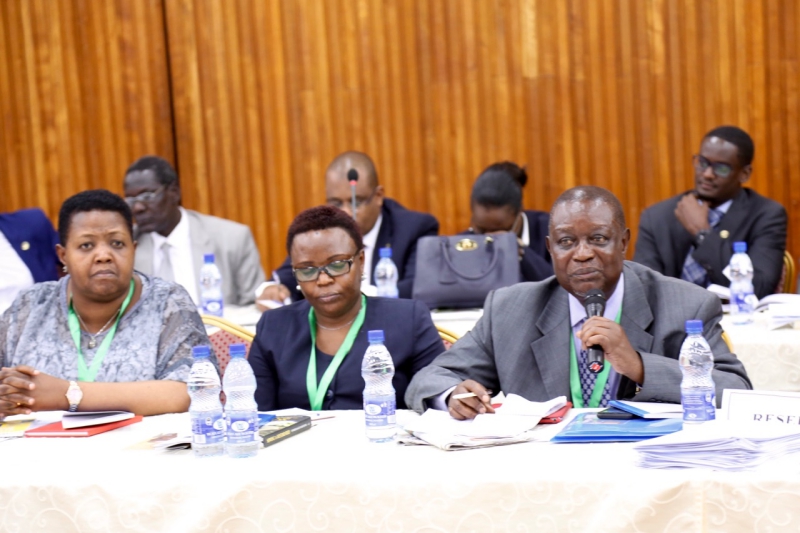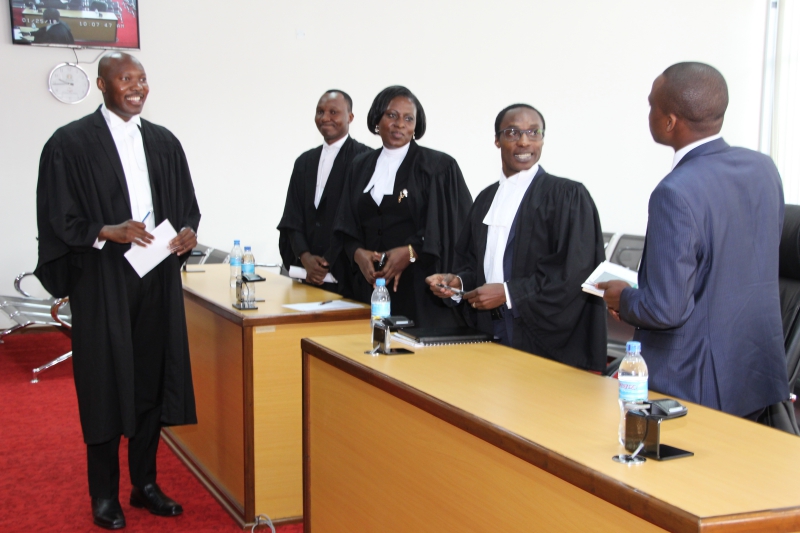
Call for Strengthened Legislature ad EALA ends Induction programme
East African Legislative Assembly, Kampala, Uganda: January 27th 2018:
Eminent East Africans have stepped up calls for further strengthening of the regional Assembly and the integration process as the week-long induction programme of the new Members ended in Kampala.
The Speaker Emeritus (2nd Assembly) of EALA, Rt Hon Abdirahin Abdi challenged the 4th EALA to push for its autonomy if it is to effectively undertake its mandate. Rt Hon Abdi is categorical that administrative and financial autonomy will give the regional Assembly the much- needed impetus and space to drive the integration process.
In his paper entitled, “Thoughts and Experiences, Lessons learnt and recommendations about the operations of EALA and the EAC in General”, Rt Hon Abdi implored the legislators to take advantage of the provisions of the Treaty in the quest to re-energise the workings of EALA. “I urge you to generate your own work and to demand Council reports in line with Provisions of Article 49(2) (d) and 59 of the Treaty”, he said.
The former Speaker also added that the decisions of the Assembly were determined by majority vote and thus EALA should not be bogged down by the principle of consensus.
The former Speaker who presided over EALA during the period June 2007-2012, told the legislators not only to prioritise key activities – but to allocate the resources in the same direction.
On his part, immediate former Speaker of the 3rd Assembly, Rt Hon Daniel F. Kidega called on new Members to spend time on research in order to effectively contribute to the debates in the house from a standpoint of information. He reiterated the need for Members to effectively utilize the Committees – which he said, make significant contribution to the work of the Assembly.
He maintained that as a regional legislature, it was necessary for Members to avoid taking country positions in the debates but rather to embrace the regional standpoint. “The idea of integrating EAC and the region must always be the bigger picture”, Rt Hon Kidega said.
Rt Hon Kidega also urged the new legislators to embrace financial discipline and decorum in their work.
Addressing the House, former EAC Secretary General, Hon Amanya Mushega said the original EAC took off on a sure footing – but various reasons hinged on different political ideologies led to its collapse. “The memories of the old Community however lingered on since there were real tangible benefits”, he said, leading to efforts to revive it. Other factors such as globalization, the need for wider markets as well as the historical and political ties also played a key part in revival strategies, Hon Mushega stated.
The former Secretary General called for inculcation of confidence building measures as a stepping stone to real integration and said the Community is supposed to be people-centred and private sector driven. He however lamented that more needs to be done to spark a conducive environment for the private sector to thrive. Hon Mushega also said the dictates of good governance and adherence to universal principles of human rights should be adhered to.
On the question of whether the current EAC is on track, the former Secretary General retorted that: for the better part, the EAC had remained on track. However, the question of timing and speed was of the essence.
Other personalities who addressed the House were, Hon Dora Byamukama, former Member whose remarks delved on the practical application of the Rules of Procedure by Members and experiences in introducing Private Members’ Bills, while the former EAC Principal Legislative Draftsman, Lawrence Kamugisha spoke on Understanding the Laws of the East African Community.
Yesterday, EALA Members are in West Nile Arua district to join on the occasion of the 32nd NRM Liberation Day. H.E. President Yoweri Museveni led the celebrations.
NOTE TO EDITORS
Article 49(2) (d) of the Treaty for the East African Community states that:
The Assembly shall discuss all matters pertaining to the Community and make recommendations to the Council as it may deem necessary for the implementation of the Treaty.
Article 59 (1) States that
Subject to the rules of procedure of the Assembly, any member may propose any motion or introduce any Bill in the Assembly:Provided that a motion which does not relate to the functions of the Community shall not be proposed in the Assembly, and a Bill which does not relate to a matter with respect to which Acts of the Community may be enacted shall not be introduced in the Assembly
- ENDS -
For more information, please contact:
Bobi Odiko
Senior Public Relations Officer
East African Legislative Assembly
Arusha, Tanzania
Tel: +255-27-2508240
Fax: +255-27-2503103
Cell: +255-787-870945, +254-733-718036
Email: BOdiko [at] eachq.org
Web: www.eala.org
About the East African Legislative Assembly:
The East African Legislative Assembly (EALA) is the Legislative Organ of the Community and has a cardinal function to further EAC objectives, through its Legislative, Representative and Oversight mandate. It was established under Article 9 of the Treaty for the Establishment of the East African Community.

